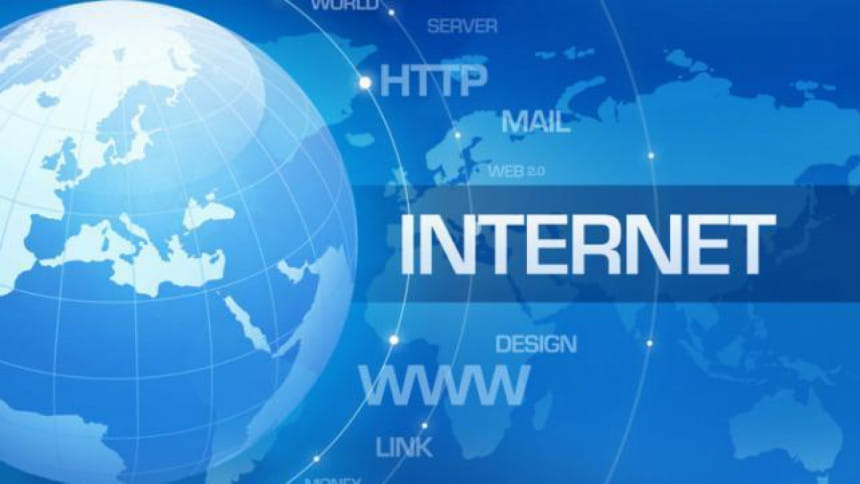Slow Internet Speed: Blame game is all they can offer

Bangladesh lags far behind a number of countries in terms of average internet speed for both mobile and broadband connections, something for which the stakeholders blame each other.
The global average mobile internet speed is 25.08 megabytes per second (mbps) while it is only 9.06mbps in Bangladesh, according to a new report on online habits released by HootSuite and We Are Social.
Similarly, while the global average for broadband connection speed is 54.33mbps, it is only 25.08mbps in Bangladesh.
Twelve countries enjoy average fixed internet connection speeds of more than 100MBPS, while ten countries enjoy average mobile connection speeds in excess of 50mbps.
In this regard, MA Hakim, president of Internet Service Providers Association Bangladesh (ISPAB), said transmission link was the main challenge in offering better internet speed in the country and blamed those given the Nationwide Telecommunication Transmission Network (NTTN) licence for it.
The NTTN is a transmission network that works for establishing telecommunication network across the country. Currently, there are five licence holders for it. The two major players are Fiber@Home and Summit Communication Limited, while the three others are government-owned and provide very limited coverage.
“In Dhaka, Chattogram and Sylhet we are offering even 100 mbps speed but outside these three cities it is quite impossible for us to offer 10 mbps because of transmission links. Cost is also an issue,” Hakim said.
He said the NTTN was the main bottleneck in the internet industry and unless this was dealt with, the quality of service would not improve for either them or mobile operators.
Previously, mobile operators could establish transmission networks like NTTN which the internet service providers (ISPs) could use. But this was stopped by the BTRC in 2013, Hakim added.
Taking this chance, the two NTTN operators created a duopoly and began charging a price which was 30 percent higher compared to that of five years ago, he alleged.
Using Singapore's example, -- which is the country that enjoys the fastest average broadband connection in the world at almost 191 mbps -- Hakim said it was down to the Singapore government spending billions of dollars to connect all the households with fibre optic cable.
Meanwhile, the Bangladesh government developed a network, after spending more than a thousand crore taka. However, this was now controlled by two NTTN operators who used it to boost their revenue and not benefit the citizens, he alleged.
Mobile operators also echoed ISPAB's views and said they also believed the NTTN was the bottleneck to offering better service.
A senior executive officer of a mobile operator said the issue of the transmission networking ecosystem was recently raised on January 23 by the top three mobile operators and they requested the telecom regulatory body to remove the challenges -- not being provided core fibre and high price.
Contacted, NTTN operators said mobile operators could not increase the data speed as they hadn't invested properly but they admitted that there were some issues regarding broadband connections.
“In about 70 percent cases, they are trying to use microwave [radio transmission] for their internet network instead of fibre optic cable. With the microwave dependent network, internet speed will never go up to the expected level,” said Sumon Ahmed Sabir, chief technology officer of Fiber@Home.
For broadband connections, Sabir admitted that there were some challenges but it was not as big as it had been made out to be.
WHAT THE REPORT SHOWS
The Digital 2019 report, created by social media management platform Hootsuite and digital marketing agency We Are Social, shows that Iceland tops the mobile connection speed rankings with a speed of 72.77 mbps-- eight times higher than that in Bangladesh.
It also showed that most time spent online was done via mobile devices, with the greatest portion of it spent on social media.
It also charted an exponential increase in the number of new internet users. Bangladesh -- with a growth rate of 12% -- ranked ninth in the internet growth ranking while India, China and USA positioned first, second and third respectively.
The report revealed that 57% of the global population was now connected to the internet, spending an average of 6.5 hours online each day.
In terms of demographics, people aged between 18-24 years were the top social media users in Bangladesh, according to the report, adding that social media usage and people's age were inversely related.
A total of 47 percent of people aged between 18-24 years use social media in the country of whom 33 percent are male and only 14 percent are female.
Out of the total social media users, around 74 percent users are male.
The report said Bangladesh recorded one of the largest increase countries in terms of Facebook audience, coming after India and Philippines.
The percentage is also growing. In 2018, more than 360 million new users accessed the internet.
Globally, 57% of the population now uses the internet, according to the report, which is based on data from sources, including the United Nations, the US census, the World Bank, the market research company Global Web Index and statistics site InternetWorldStats.
The country with the greatest connected percentage of the population is the United Arab Emirates, with 99%; at the other end of the scale is Ghana, where only 35% of the population uses the internet.

 For all latest news, follow The Daily Star's Google News channel.
For all latest news, follow The Daily Star's Google News channel. 








Comments